- Home
- Diane Ackerman
A Natural History of Love
A Natural History of Love Read online
ACCLAIM FOR
Diane Ackerman’s
A NATURAL HISTORY OF LOVE
“By turns playful, serious, poetic and scientific, Ackerman has drawn upon a vast variety of sources to create a compelling compendium of that great intangible, love.”
—Los Angeles Daily News
“In a glorious tumult, Ackerman looks at the siren call of mermaids, the Indy 500, and the ecstasies of a levitating seventeenth-century saint. And her exploration of young girls’ love for horses takes her to Lascaux, where she wonderfully and wonderingly describes the ‘floodtide of horses’ crashing down through our dreams.”
—The New Yorker
“An atlas through the mysterious ways of the human heart…. Ackerman tackles her subjects with a Sherlock Holmes-ian zeal, employing equal parts philosophy, mythology, history, science, even erotica, to shed light on this most noble of human emotions.”
—USA Today
“Studded with accurate, witty versions of all the facts that made biology class interesting…. A Natural History is a wide-angle vision of love—informing, reminding, entertaining.”
—Harper’s Bazaar
“Ackerman is an alchemist who transmutes leaden data into literary gold. Her book is a voluptuous valentine to a most exalted emotion, a lusty ballad to erotic pleasures, and an ode to romantic attachment.”
—Hartford Courant
“Ackerman’s language is so rich as to be practically carnal…. What throbbing stuff she has gleaned from history’s sheets.”
—Columbus Dispatch
BOOKS BY Diane Ackerman
A Natural History of Love
The Moon by Whalelight
Jaguar of Sweet Laughter: New and Selected Poems
A Natural History of the Senses
Reverse Thunder
On Extended Wings
Lady Faustus
Twilight of the Tenderfoot
Wife of Light
The Planets: A Cosmic Pastoral
Diane Ackerman
A NATURAL HISTORY OF LOVE
Diane Ackerman was born in Waukegan, Illinois. She received her B.A. from Pennsylvania State University and an M.F.A. and Ph.D. from Cornell University. Her poetry has been published in many leading literary journals, and in the books The Planets: A Cosmic Pastoral (1976), Wife of Light (1978), Lady Faustus (1983), Reverse Thunder: A Dramatic Poem (1988), and Jaguar of Sweet Laughter: New and Selected Poems (1991).
Her works of nonfiction include, most recently, A Natural History of Love (1994); The Moon by Whalelight and Other Adventures Among Bats, Crocodilians, Penguins, and Whales (1991); A Natural History of the Senses (1990); and On Extended Wings (1985), a memoir of flying. She is at work on a second book of nature writings, The Rarest of the Rare.
Ms. Ackerman has received the Academy of American Poets’ Lavan Award, and grants from the National Endowment for the Arts and the Rockefeller Foundation, among other recognitions. She has taught at several universities, including Columbia and Cornell, and she is currently a staff writer for The New Yorker.
For George,
whose heart is bright as summer
PERMISSIONS
Grateful acknowledgment is made to the following for permission to reprint previously published material:
Branden Publishing Co.: Excerpts from The Symposium by Plato, translated by B. Jowett. Reprinted by permission of Branden Publishing, Boston.
Doubleday, a division of Bantam, Doubleday, Dell Publishing Group, Inc.: Excerpt from entry about Ludwig van Beethoven from Encyclopedia of Great Composers by Milton Cross. Reprinted by permission of Doubleday.
Harcourt Brace and Company and Peter Owen Ltd., Publishers: Excerpt from The Diary of Anaïs Nin 1931-1934 by Anais Nin. Copyright © 1966 by Anaïs Nin. Rights throughout the world excluding the United States, Canada, and Israel are controlled by Peter Owen Ltd., Publishers, London. Reprinted by permission of Harcourt Brace and Company and Peter Owen Ltd., Publishers.
Indiana University Press: Excerpt from The Art of Love by Ovid, translated by R. Humphries. Reprinted by permission of Indiana University Press.
Alfred A. Knopf, Inc. and Faber and Faber Ltd.: Three lines from “Connoisseur of Chaos” from Collected Poems by Wallace Stevens. Copyright © 1942 by Wallace Stevens. Copyright renewed 1970 by Holly Stevens. Rights throughout the British Commonwealth are controlled by Faber and Faber Ltd. Reprinted by permission of Alfred A. Knopf, Inc., and Faber and Faber Ltd.
Jon Landau Management: Four lines from “Fire” by Bruce Springsteen. Copyright © Bruce Springsteen: ASCAP. Reprinted by permission.
William Morrow & Company, Inc. and Lescher & Lescher, Ltd.: Excerpts from French Lovers: From Heloise and Abelard to Beauvoir and Sartre by Joseph Barry. Copyright © 1987 by Joseph Barry. Rights throughout the British Commonwealth are controlled by Lescher & Lescher, Ltd. Reprinted by permission.
New Directions Publishing Corporation: Excerpt from poem on pages 14–15 of Love Poems of Ancient Egypt by Ezra Pound and Noel Stock. Copyright © 1962 by Noel Stock. Reprinted by permission of New Directions Publishing Corporation.
New Directions Publishing Corporation and David Higham Associates: Two lines from “When All My Fine and Country Senses See” and eleven lines from “If I Were Tickled by the Rub of Love” from Poems of Dylan Thomas by Dylan Thomas. Copyright © 1939 by New Directions Publishing Corporation. First published in Poetry. Rights throughout the world excluding the United States are controlled by David Higham Associates. Reprinted by permission of New Directions Publishing Corporation and David Higham Associates.
Penguin Books Ltd: Excerpt from the Introduction to Romeo and Juliet by William Shakespeare, edited by T.J.B. Spencer (Penguin Books, 1967). Introduction copyright © 1967 by T.J.B. Spencer. Reprinted by permission.
Random House, Inc.: Excerpts from Remembrance of Things Past, Volume Two by Marcel Proust, translated by C. K. Scott Moncrieff and Terence Kilmartin. Translation © 1981 by Random House, Inc. and Chatto and Windus. Published in the United States Kingdom by Chatto and Windus. Reprinted by permission of Random House, Inc.
Routledge: Excerpts from Women in Athenian Law & Life by Roger Just, published by Routledge. Reprinted by permission.
Scarborough House and MBA Literary Agents Limited: Excerpts from Sex in History by Reay Tannahill. Copyright © 1980 by Reay Tannahill. Originally published by Stein & Day. Rights in the British Commonwealth are controlled by MBA Literary Agents Limited, London. Reprinted by permission of Scarborough House Publishers and MBA Literary Agents Limited.
Sterling Lord Literistic and The Hogarth Press: Excerpt from The Aeneid by Virgil, translated by Cecil Day-Lewis. Copyright © 1932 by Cecil Day-Lewis. Published in the United States by Oxford University Press. Rights throughout the world excluding the United States are controlled by The Hogarth Press, London. Reprinted by permission of Sterling Lord Literistic and The Hogarth Press.
ACKNOWLEDGMENTS
Some sections of this book (in different versions) first appeared in Parade, The Condé Nast Traveler, Travel-Holiday, The New York Times Magazine, Allure, The New York Times Book Review, and American Photo. I’m grateful to the editors of those periodicals for their hospitality and encouragement.
Special thanks to the following friends and colleagues who have been generous with their time, expertise, and encouragement: Ann Druyan, Chris Furst, Lindy Hazan, Jane Marie Law, Linda Mack, Jeanne Mackin, Nancy Skipper, Meredith Small, Deva Sobel, and Paul West.
CONTENTS
Cover
Other Books by this Author
About the Author
Title Page
Dedication
Permissions
Acknowledgements
Int
roduction: Love’s Vocabulary
A LONG DESIRE: THE HISTORY OF LOVE
Egypt
History’s Paramour, the Serpent Queen
Art in Ancient Egypt
The Hieroglyphic Love Poems
My Sister, My Bride
A Long Desire
Greece
The World of the Citizen King
The Woman’s World
Men Loving Men
The Family
Orpheus and Eurydice
Rome
The Nightmare of Girls
Dido and Aeneas
The Family
Oh, Victoria!
Ovid and the Art of Love
Decorating Leisure Time
The Middle Ages
The Birth of Chivalry
Books of Love
Troubadours
The Heart’s Rebellion
The Origins of Courtly Love
Abelard and Heloise
Modern Days
The Angel and the Witch
Romeo and Juliet
Bridled Hearts
A Waking Swoon
A Return to Courtly Love
Domestic Paradise
Modern Love
THE HEART IS A LONELY HUNTER: IDEAS ABOUT LOVE
Plato: The Perfect Union
Stendhal Meets the Deep South
Denis de Rougemont: Love and Magic
Marcel Proust and the Erotics of Waiting
Freud: The Origins of Desire
Attachment Theory
ALL FIRES THE FIRE: THE NATURE OF LOVE
The Loving Impaired
Disabling Love
The Horror of the Ik
Brain-Stem Sonata: The Neurophysiology of Love
The Evolution of Love
The Plastic Brain
New-Age Sensitive Guys
Adultery
The Battle of the Sexes
The Chemistry of Love
Mother Love, Father Love
The Cuddle Chemical
The Infatuation Chemical
The Attachment Chemical
The Chemistry of Divorce
Aphrodisiacs
A NECESSARY PASSION: THE EROTICS OF LOVE
Fire from the Flesh: Why Sex Evolved
The Spice of Life
The Face
The Evolution of the Face
Survival of the Cutest
Facing Our Biases
The Hair
Women and Horses
Men and Cars
The Indy 500
The Lightest Longing: Sex and Flying
Wings over Africa
Men and Mermaids
Sexual Chic: Perversion as Fashion
Kissing
On the Sensuality of Looking
PASSING STRANGE AND WONDERFUL: LOVE’S CUSTOMS
Patterns in Nature
The Courtship
Flesh of My Flesh: The Marriage
Of Cocks and Cunts
Love on the Edge: Adultery, Extravagant Gestures, and Crimes of Passion
POINTS FOR A COMPASS ROSE: VARIETIES OF LOVE
Altruism
For the Love of Children: Interplast
For the Love of Strangers: Life and Death in the South Seas
On Religious Love
On Transference Love
On the Love of Pets
Postscript: The Museum
Selected Bibliography
Copyright
INTRODUCTION:
LOVE’S VOCABULARY
Love is the great intangible. In our nightmares, we can create beasts out of pure emotion. Hate stalks the streets with dripping fangs, fear flies down narrow alleyways on leather wings, and jealousy spins sticky webs across the sky. In daydreams, we can maneuver with poise, foiling an opponent, scoring high on fields of glory while crowds cheer, cutting fast to the heart of an adventure. But what dream state is love? Frantic and serene, vigilant and calm, wrung-out and fortified, explosive and sedate—love commands a vast army of moods. Hoping for victory, limping from the latest skirmish, lovers enter the arena once again. Sitting still, we are as daring as gladiators.
When I set a glass prism on a windowsill and allow the sun to flood through it, a spectrum of colors dances on the floor. What we call “white” is a rainbow of colored rays packed into a small space. The prism sets them free. Love is the white light of emotion. It includes many feelings which, out of laziness and confusion, we crowd into one simple word. Art is the prism that sets them free, then follows the gyrations of one or a few. When art separates this thick tangle of feelings, love bares its bones. But it cannot be measured or mapped. Everyone admits that love is wonderful and necessary, yet no one can agree on what it is. I once heard a sportscaster say of a basketball player, “He does all the intangibles. Just watch him do his dance.” As lofty as the idea of love can be, no image is too profane to help explain it. Years ago, I fell in love with someone who was both a sport and a pastime. At the end, he made fade-away jump shots in my life. But, for a while, love did all the intangibles. It lets us do our finest dance.
Love. What a small word we use for an idea so immense and powerful it has altered the flow of history, calmed monsters, kindled works of art, cheered the forlorn, turned tough guys to mush, consoled the enslaved, driven strong women mad, glorified the humble, fueled national scandals, bankrupted robber barons, and made mincemeat of kings. How can love’s spaciousness be conveyed in the narrow confines of one syllable? If we search for the source of the word, we find a history vague and confusing, stretching back to the Sanskrit lubhyati (“he desires”). I’m sure the etymology rambles back much farther than that, to a one-syllable word heavy as a heartbeat. Love is an ancient delirium, a desire older than civilization, with taproots stretching deep into dark and mysterious days.
We use the word love in such a sloppy way that it can mean almost nothing or absolutely everything. It is the first conjugation students of Latin learn. It is a universally understood motive for crime. “Ah, he was in love,” we sigh, “well, that explains it.” In fact, in some European and South American countries, even murder is forgivable if it was “a crime of passion.” Love, like truth, is the unassailable defense. Whoever first said “love makes the world go round” (it was an anonymous Frenchman) probably was not thinking about celestial mechanics, but the way love seeps into the machinery of life to keep generation after generation in motion. We think of love as a positive force that somehow ennobles the one feeling it. When a friend confesses that he’s in love, we congratulate him.
In folk stories, unsuspecting lads and lasses ingest a love potion and quickly lose their hearts. As with all intoxicants, love comes in many guises and strengths. It has a mixed bouquet, and may include some piquant ingredients. One’s taste in love will have a lot to do with one’s culture, upbringing, generation, religion, era, gender, and so on. Ironically, although we sometimes think of it as the ultimate Oneness, love isn’t monotone or uniform. Like a batik created from many emotional colors, it is a fabric whose pattern and brightness may vary. What is my goddaughter to think when she hears her mother say: “I love Ben & Jerry’s Cherry Garcia ice cream;” “I really loved my high school boyfriend;” “Don’t you just love this sweater?” “I’d love to go to the lake for a week this summer;” “Mommy loves you.” Since all we have is one word, we talk about love in increments or unwieldy ratios. “How much do you love me?” a child asks. Because the parent can’t answer I (verb that means unconditional parental love) you, she may fling her arms wide, as if welcoming the sun and sky, stretching her body to its limit, spreading her fingers to encompass all of Creation, and say: “This much!” Or: “Think of the biggest thing you can imagine. Now double it. I love you a hundred times that much!”
When Elizabeth Barrett Browning wrote her famous sonnet “How do I love thee?” she didn’t “count the ways” because she had an arithmetical turn of mind, but because English poets have always had to search hard for personal si
gnals of their love. As a society, we are embarrassed by love. We treat it as if it were an obscenity. We reluctantly admit to it. Even saying the word makes us stumble and blush. Why should we be ashamed of an emotion so beautiful and natural? In teaching writing students, I’ve sometimes given them the assignment of writing a love poem. “Be precise, be individual, and be descriptive. But don’t use any clichés,” I caution them, “or any curse words.” Part of the reason for this assignment is that it helps them understand how inhibited we are about love. Love is the most important thing in our lives, a passion for which we would fight or die, and yet we’re reluctant to linger over its name. Without a supple vocabulary, we can’t even talk or think about it directly. On the other hand, we have many sharp verbs for the ways in which human beings can hurt one another, dozens of verbs for the subtle gradations of hate. But there are pitifully few synonyms for love. Our vocabulary of love and lovemaking is so paltry that a poet has to choose among clichés, profanities, or euphemisms. Fortunately, this has led to some richly imagined works of art. It has inspired poets to create their own private vocabularies. Mrs. Browning sent her husband a poetic abacus of love, which in a roundabout way expressed the sum of her feelings. Other lovers have tried to calibrate their love in equally ingenious ways. In “The Flea,” John Donne watches a flea suck blood from his arm and his beloved’s, and rejoices that their blood marries in the flea’s stomach.
Yes, lovers are most often reduced to comparatives and quantities. “Do you love me more than her?” we ask. “Will you love me less if I don’t do what you say?” We are afraid to face love head-on. We think of it as a sort of traffic accident of the heart. It is an emotion that scares us more than cruelty, more than violence, more than hatred. We allow ourselves to be foiled by the vagueness of the word. After all, love requires the utmost vulnerability. We equip someone with freshly sharpened knives; strip naked; then invite him to stand close. What could be scarier?
If you took a woman from ancient Egypt and put her in an automobile factory in Detroit, she would be understandably disoriented. Everything would be new, especially her ability to stroke the wall and make light flood the room, touch the wall elsewhere and fill the room with summer’s warm breezes or winter’s blast. She’d be astonished by telephones, computers, fashions, language, and customs. But if she saw a man and woman stealing a kiss in a quiet corner, she would smile. People everywhere and everywhen understand the phenomenon of love, just as they understand the appeal of music, finding it deeply meaningful even if they cannot explain exactly what that meaning is, or why they respond viscerally to one composer and not another. Our Egyptian woman, who prefers the birdlike twittering of a sistrum, and a twentieth-century man, who prefers the clashing jaws of heavy metal, share a passion for music that both would understand. So it is with love. Values, customs, and protocols may vary from ancient days to the present, but not the majesty of love. People are unique in the way they walk, dress, and gesture, yet we’re able to look at two people—one wearing a business suit, the other a sarong—and recognize that both of them are clothed. Love also has many fashions, some bizarre and (to our taste) shocking, others more familiar, but all are part of a phantasmagoria we know. In the Serengeti of the heart, time and nation are irrelevant. On that plain, all fires are the same fire.

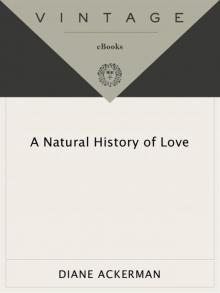 A Natural History of Love
A Natural History of Love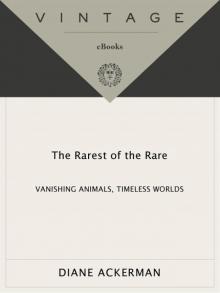 The Rarest of the Rare: Vanishing Animals, Timeless Worlds
The Rarest of the Rare: Vanishing Animals, Timeless Worlds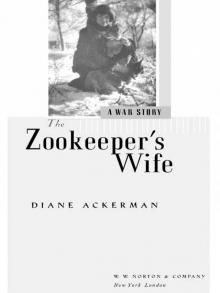 The Zookeeper's Wife: A War Story
The Zookeeper's Wife: A War Story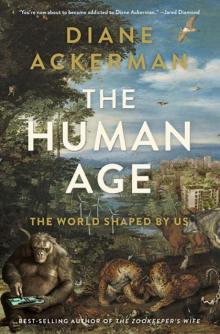 The Human Age: The World Shaped by Us
The Human Age: The World Shaped by Us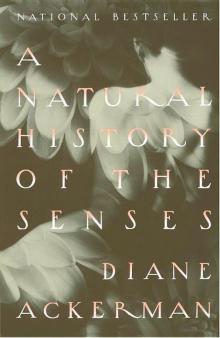 A Natural History of the Senses
A Natural History of the Senses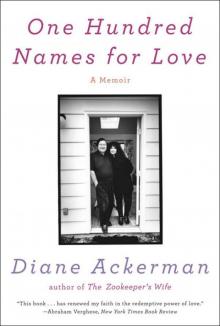 One Hundred Names for Love: A Memoir
One Hundred Names for Love: A Memoir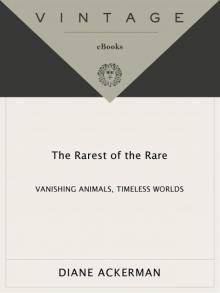 The Rarest of the Rare
The Rarest of the Rare